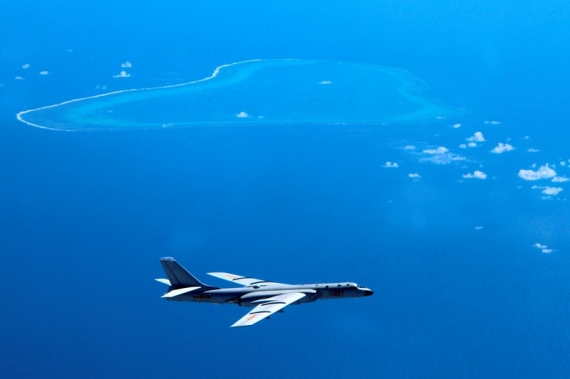Analysis: Putting international law to work in the code of conduct

In this undated file photo released by Xinhua News Agency, a Chinese H-6K bomber patrols the islands and reefs in the South China Sea. Xinhua News Agency/File photo
As far as the Philippines is concerned, it has been a quiet July for foreign policy. Although the one-year anniversary of The Hague ruling on the Philippine case against China has just passed, there have been too few events marking the occasion or even debating its significance. The Stratbase ADR Institute held a forum on this topic last week, but there is still plenty of room for us to talk about where our national priorities lay on this issue.
International law at work
While the Philippines has been relatively quiet, there continue to be interesting developments in the South China Sea. Throughout July, various news sources have reported that US aircraft and vessels have been challenging what China believes to be its waters in the South China Sea. These latest exchanges have come on top of the greatly publicized freedom of navigation operation that the US conducted in May around Mischief Reef. These developments appear to confirm that the Trump administration is not taking a softer approach on upholding the rules-based order.
Even more interesting is the decision by Indonesia to rename the waters in the northern part of its exclusive economic zone (EEZ) the “North Natuna Sea.” This move is awfully familiar to our country—we did the same thing with the West Philippine Sea. This move was not welcomed by China: one foreign ministry spokesman said that the change “makes no sense at all.” China’s illegal nine-dash line is so expansive, it overlaps with that section of Indonesia’s EEZ, even more distant from China than the Spratly islands. Could we be seeing similar moves from ASEAN partners soon?
These decisions by other countries just go to show that international law still matters. This is an important point for that we can do more in the Philippines to appreciate.
Emphasizing the importance of the ruling
Just over a year ago, the Permanent Court of Arbitration in The Hague ruled that China’s vaunted “nine-dash line” and subsequent historic claims over much of South China Sea had no basis in international law, in particular the United Nations Convention on the Law of the Sea (UNCLOS). The decisive legal victory for the Philippines, the first state to challenge Beijing in such a public forum, marked an important milestone in a protracted territorial dispute.
As our country takes its next steps in protecting its interests in the West Philippine Sea, we should resume our leadership in fortifying international law. As this year’s chair of ASEAN, we have an opportunity to steer the discussions on the code of conduct. In our view, the code of conduct must reaffirm the arbitral tribunal’s award to the Philippines as a guide for all our countries’ behavior in the South China Sea. In this context, it bears emphasis that the Hague ruling affirmed that maritime entitlements should be governed by UNCLOS and that any alleged right not anchored on UNCLOS should be denied. The conclusion of a legally binding code of conduct along these lines must be a priority.
Moreover, the Philippines should continue to actively present its case as a legal precedent for ASEAN claimant-states to further clarify their respective maritime entitlements and boundaries as well as align their respective domestic policies with UNCLOS provisions. Ultimately, the award should not be seen as mere beneficial to the interest of the Philippines, but to all claimants in the South China Sea with common interests in freedom of navigation for trade and other legitimate activities.
At the end of the day, we believe that all the claimants should work toward resolving their disputes peacefully and amicably by making full use of the legal processes available to them, in accordance with the milestones that the region has reached, such as in the 2002 Declaration on the conduct of parties in the South China Sea and, of course, the arbitral tribunal’s ruling.
Caution should not paralyze us
Unfortunately, the administration’s choice to normalize diplomatic relations with Beijing while cooling ties the United States has effectively put the ruling on the back burner. Under the chairmanship of the Philippines, the Association of Southeast Asian Nations (ASEAN) has likewise been lukewarm in terms of taking China to task over its militarization of the South China Sea.
Whether this direction will bear fruit eventually is a matter of conjecture, but in the intervening months since the ruling, Chinese military build-up in the disputed waters as well as harassment of Filipino fishermen by Chinese vessels didn’t abate. Recently, a report from the Asia Maritime Transparency Initiative revealed that new missile shelters and radar and communication facilities are being installed in Fiery Cross and Mischief and Subi Reefs.
There is a sense of fragile peace in the region, a peace that is undermined by what many see as China’s willful disregard and flouting of international law. A year after the ruling, we should revisit and reassess the Philippines’ policy position in light of China’s actions.
Ultimately, all diplomatic avenues must be exhausted. We must protest what is unlawful, coercive, and contrary to the correct principles that govern relations between states. We should also take inspiration from other countries that are also taking steps to protect their own interests in our region. Most of us in Southeast Asia are relatively small states, but we are not all silent on our national and our regional interests. In taking the right strategy, our government can only enhance its standing among our peers and ensure its legacy for the generations that will succeed us.
Dindo Manhit is the president of think tank Stratbase Albert del Rosario Institute, a partner of Philstar.com.
- Latest
- Trending































